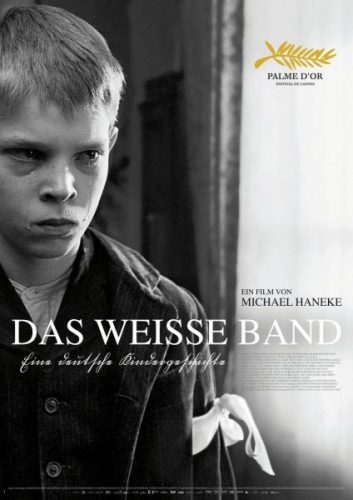 Das Weisse Band, Eine deutsche Kindergeschichte or to translate The White Ribbon is the latest offering from Funny Games man Michael Haneke. The film is set upon the eve of the First World War in a microcosmic northern German village in which Haneke utilizes his settings to comment on the psychological nature of the impending events and of society in itself. Essentially the story follows a group of families and how they inter-relate with village life together until a series of sinister events begin to upset the balance of their society. Haneke has claimed the film to be about the origin of every kind of terrorism, be it of political or religious nature and as his previous efforts such as Cache, Funny Games & the Piano Teacher have shown, Haneke never fails to interrogate the most taboo of subject matters with a virtuosity and delicate sensibility that ultimately makes his storytelling a completely human and compelling incarnation.
Das Weisse Band, Eine deutsche Kindergeschichte or to translate The White Ribbon is the latest offering from Funny Games man Michael Haneke. The film is set upon the eve of the First World War in a microcosmic northern German village in which Haneke utilizes his settings to comment on the psychological nature of the impending events and of society in itself. Essentially the story follows a group of families and how they inter-relate with village life together until a series of sinister events begin to upset the balance of their society. Haneke has claimed the film to be about the origin of every kind of terrorism, be it of political or religious nature and as his previous efforts such as Cache, Funny Games & the Piano Teacher have shown, Haneke never fails to interrogate the most taboo of subject matters with a virtuosity and delicate sensibility that ultimately makes his storytelling a completely human and compelling incarnation.
Having beaten off stiff competition from the likes of Quentin Tarantino's Inglourious Basterds, The White Ribbon won 2009's Palme d'Or at the 62nd Cannes Film Festival and further won the Golden Globe for Best Foreign Language Film, and along with two further Oscar nominations, Haneke's disturbing offering seems set to lead the way for World Cinema this year. There appears to be always one major international non-English film that grabs both the critics and audiences attention alike around the award season, before it has manifested with the likes of The Lives of Others & the City of God, and with this tradition continuing to prosper, it has become a staple genre and worthy category in all contemporary accolades. This is of course is an extremely positive accountancy, as foreign films can often supersede the likes of Hollywood with innovative and refreshingly original ways of film-making. The White Ribbon is certainly and deservingly prominent in this categorization.
The child actors in this film are collectively the principal antagonists, they pose the greatest threat to the fellow villagers, and yet none of this is certain, we are never shown anything, every single facet is surrendered to our imagination, leaving this film to be uniquely subjective in its room for interpretation. Haneke never dictates to you what he wants you to think or feel, he lets you decide, however every aspect of the script, casting, acting and cinematography is so zealously crafted that the intelligence of the film-maker permeates our sub-consciousness and we are ultimately forced to surrender under Haneke's vicious and sordid spell. Haneke has almost taken the role of a magician in that, doubt is the only the certainty throughout, that we are teased with the notions of what we believe to be true and yet are never allowed to indulge. Nothing is handed to the audience, you have to work for it, and this is a rare and welcomed commodity in film-making. Hollywood is increasingly guilty of forcing everything down our throats, so much so that we have become numb to even the most extreme of issues. Haneke, however, understand the necessity for subtlety, that less is indeed more.
Furthermore, this film manages to actually make you both physically and mentally uncomfortable; it is so unnerving in its hitchcockian direction that it is impossible to not be intrigued and completely captivated in the every aspect of what you are experiencing. There are some less intense offerings in a display of some genuine and funny touches from the film s narrator and a charming side-plot love story that manages to fluctuate around the meanderings of the principle hypothesis. However, The White Ribbon is one of the most accomplished and terrifyingly horrible films you will ever watch, without ever showing one drop of blood or psycho. Haneke is almost pornographic in his storytelling and yet paradoxically void of any aesthetics responsible for such connotations. This film manages to convey everything with suggestion without ever letting up its secrets.
In conclusion, The White Ribbon is not for intellectually challenged people or for those of you that crave Sarah Michelle Gellar s latest attempt at remaking Japanese horror classics. This is horror of the truest nature, a film that manages to scare the living sh** out of you without ever showing you anything. The horror lies within yourself and your interpretation of the events. It draws great parallels with Lars Von Trier's Dogville in its meditation and assessment of the dark side of human nature. Haneke's black and white drama has proven to be a true piece of art and an example of complete mastery of the medium, it is not easy viewing and it may take numerous viewings for it to digest but you will be rewarded as you enter Haneke s misanthropic nihilistic and furiously existentialist contemplation of the nature of the human condition.
Das Weisse Band Trailer
For more info check: http://www.sonyclassics.com/thewhiteribbon/











